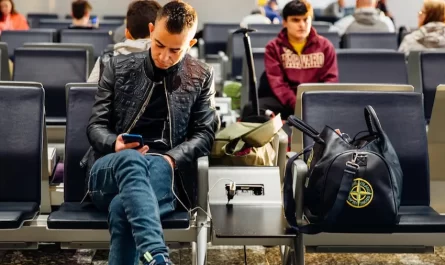Preparing for takeoff? Discover the foods and drinks to steer clear of during your flight.
Contents
- 1 What foods should you avoid when traveling?
- 2 What is the best food to eat on a plane?
- 3 Why should you not drink tea or coffee on a plane?
- 4 Avoid High Sodium Snacks
- 5 Avoid Heavy or Fatty Foods
- 6 Carbonated Beverages
- 7 Avoid Foods with Strong Odors
- 8 Beans and Cruciferous Vegetables
- 9 Caffeine and Alcohol
Flying can be an exhilarating experience, offering the chance to soar above the clouds and journey to far-off destinations. However, when it comes to dining at 30,000 feet, not all foods are created equal. The unique conditions of air travel can affect both your comfort and health, making it crucial to choose your in-flight meals wisely. Let’s explore the types of food you might want to avoid to ensure a more pleasant flight experience.
Traveling can be challenging enough without the added discomfort of certain foods. Before boarding your flight, think twice about indulging in these:
Fried foods like French fries are a no-go due to their high fat and sodium content, which can lead to heartburn, fluid retention, and uncomfortable bloating. Craving a pre-flight burger? Consider an alternative. Red meat can be hard to digest, potentially causing odors and discomfort mid-air. Beans and cruciferous vegetables such as broccoli and cauliflower, known for causing gas, are best saved for after you land to spare yourself and your seatmates any awkwardness. Even apples, despite their health appeal, can contribute to bloating due to their high fiber content. Opting for lighter, easier-to-digest options will make your journey more enjoyable.
What foods should you avoid when traveling?
When traveling, it’s advisable to avoid foods that may increase your risk of gastrointestinal discomfort or foodborne illness. These include:
- Raw or undercooked meats and seafood: These can carry harmful bacteria or parasites.
- Unpasteurized dairy products: These can contain harmful bacteria like Listeria or E. coli.
- Street food from questionable sources: While often delicious, there’s a higher risk of food poisoning if the food isn’t handled or cooked properly.
- High-sodium snacks: These can lead to dehydration, especially during air travel.
- Heavy, fatty, or spicy foods: These can cause indigestion and discomfort, especially when you’re sitting for long periods.
What is the best food to eat on a plane?
The best foods to eat on a plane are those that are hydrating, easy to digest, and nutritious:
- Fruits and vegetables: They’re high in water content and vitamins.
- Whole grains: They provide long-lasting energy without causing bloating.
- Lean proteins: Foods like chicken or fish can keep you satiated without feeling heavy.
- Nuts and seeds: These are great for snacking and are packed with healthy fats.
- Water and hydrating beverages: Staying hydrated is key to avoiding jet lag and feeling fresh upon arrival.
Why should you not drink tea or coffee on a plane?
Drinking tea or coffee on a plane is discouraged for a few reasons:
- Water quality: The water used for making tea and coffee onboard might not always be from a fresh or reliable source. Aircraft water tanks are not always cleaned as thoroughly as they should be, which can lead to contamination.
- Dehydration: Both tea and coffee are diuretics, which can lead to dehydration, especially in the already dry environment of an airplane cabin.
- Taste alteration at altitude: The cabin pressure and dry air can dull your taste buds, making tea or coffee taste different (often worse) than on the ground.
Choosing bottled water, juice, or herbal teas is generally a safer and more hydrating choice while flying.
Avoid High Sodium Snacks
Airplane cabins have lower humidity levels, which can lead to dehydration. Consuming high sodium foods like pretzels, chips, or processed snacks can exacerbate this effect, increasing thirst and discomfort. Instead, opt for low-sodium snacks or fresh fruits and vegetables to stay hydrated and feel better upon landing.
Avoid Heavy or Fatty Foods
Rich, fatty meals can be hard to digest, especially when you’re sitting still for hours. Foods heavy in fat can lead to stomach discomfort, bloating, and even nausea during your flight. Choose lighter options such as salads, lean proteins, or whole grains to keep your digestive system in check.
Carbonated Beverages
The gas in carbonated drinks expands at higher altitudes, which can lead to bloating and gas pains. It’s best to avoid sodas and sparkling water while flying. Opt for still water, juice, or herbal teas to stay hydrated and comfortable throughout your journey.
Avoid Foods with Strong Odors
Consideration for your fellow passengers is key when flying. Foods with potent smells, such as tuna sandwiches, hard-boiled eggs, or foods with strong spices, can be unpleasant in the confined space of an aircraft cabin. It’s polite to choose foods with milder aromas to ensure a pleasant environment for everyone on board.
Beans and Cruciferous Vegetables
While beans and vegetables like broccoli and cauliflower are healthy, they can also cause gastrointestinal distress due to their high fiber content. To avoid discomfort from gas and bloating, it may be wise to save these nutritious options for when you’re on solid ground.
Caffeine and Alcohol
Both caffeine and alcohol can have diuretic effects, leading to dehydration. They can also disrupt your sleep patterns, making it harder to adjust to time zone changes and recover from jet lag. Staying hydrated with water or herbal teas is a better choice for maintaining your well-being during and after your flight.
The Best Approach to In-Flight Dining
Eating well while flying doesn’t mean you have to compromise on taste or satisfaction. By choosing foods that are gentle on your digestive system and mindful of your environment, you can arrive at your destination feeling refreshed and ready to explore. Remember, the key to a comfortable flight often starts with what’s on your tray table. Plan ahead, stay hydrated, and choose wisely to make your sky-high dining experience as enjoyable as the rest of your journey.
What airline is cheapest?
Airlines food: In-flight Meals
The food to Avoid While Flying
USA Compensation for Delayed Flight
Things Not to Wear on a Airplane
You Don’t Need to Use Airplane Mode on Flights
What to do if you get sick during a flight
How Clean is Your Airplane?
What are the top 10 safest Airlines?
What Drives 'Gate Lice' to Queue Up Before Their Flight?
The Secret Behind the Airplane Bathroom Door
Airport Terminology
What Happens If You Miss Your Flight
What happens if your checked luggage gets lost?
Must-dos and Must-don’ts When Traveling Alone





